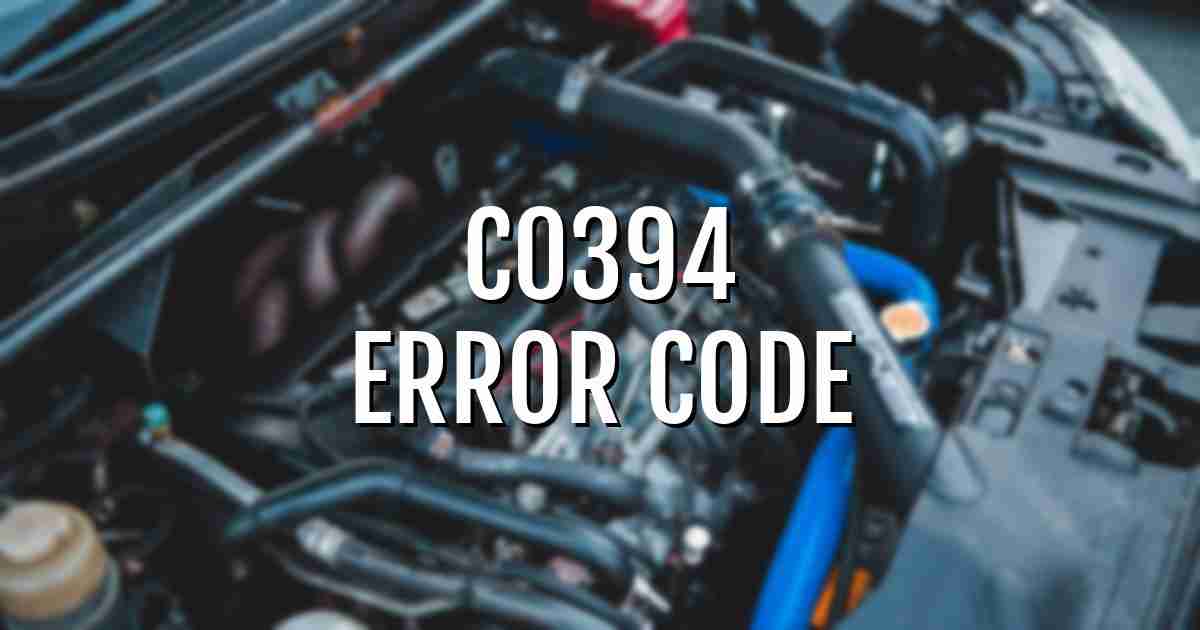OBD code C0394 indicates a fault with the Rear Axle Coupling Solenoid Temperature Sensor in the AntiLock Brake System (ABS).
Symptoms include the ABS Warning Light and Engine Light being illuminated.
The issue is typically caused by a faulty sensor, wiring harness issues, or poor electrical connections.
While not a critical problem, it should be addressed promptly to ensure proper ABS function.
A possible fix involves inspecting and repairing the sensor, wiring harness, and connectors for any damage or poor connections.
| Repair Importance Level | 10.0 (Out of 10) |
| Estimated Repair Time | Approximately 1.0 hour |
| Repair Difficulty Level | 10.0 (Out of 10) |
I know how frustrating it is to see that warning light pop up again and again. You don’t need to spend money at the mechanic just to clear it. With this pocket-friendly automatic car scanner, you can do it yourself in seconds and and avoid the time and inconvenience of driving to a mechanic. Just plug it in, connect to your Android or iOS phone, and instantly see live data. Understand the fault code, clear it right away, and decide if it’s something urgent or if you’re good to drive. It even monitors your car and sends notifications to your phone, so you’re always in control. Simple, fast, and stress-free—today’s offer price!
Symptoms of the c0394 OBD Code
The vehicle displays a warning light indicating an issue with the Electronic Brake Control Module.
- Symptoms: AntiLock Brake System (ABS) Warning Light ON.
- Engine Light ON (or Service Engine Soon Warning Light).
- Possible loss of ABS functionality.
- Brake pedal may feel different during braking.
- Unusual noises coming from the ABS system.
Causes of the c0394 OBD Code
Do you know you can clear most fault codes—but some could mean serious danger? Don’t take chances with your safety or your family’s safety. This budget-friendly car scanner makes it easy to clear fault codes in seconds while showing you exactly what’s wrong. Plug it in, connect to your Android or iOS phone, and instantly check live data. You’ll know if it’s a minor issue you can clear or something serious that needs attention—so you can drive safely and stress-free. (Today’s Deal)
Code C0394 typically indicates a fault related to the steering angle sensor circuit.
- C0394 can be caused by a faulty Rear Axle Coupling Solenoid Temperature Sensor.
- A Rear Axle Coupling Solenoid Temperature Sensor harness that is open or shorted.
- A Rear Axle Coupling Solenoid Temperature Sensor circuit with a poor electrical connection.
Fixing Error Code c0394 Step By Step
To address fault code C0394, inspect and repair the steering angle sensor circuit as needed.
- To fix OBDII code C0394, first, review the possible causes related to this code.
- Visually inspect the wiring harness and connectors associated with the ABS system.
- Check for any damaged components and ensure the connector pins are not broken, bent, pushed out, or corroded.
- If no issues are found during the visual inspection, proceed to perform a diagnostic scan tool test to further pinpoint the problem.
- Depending on the scan tool results, you may need to replace the ABS module, repair wiring issues, or reset the module.
Cost Of Fixing c0394 Fault Code
Diagnosing and repairing fault code C0394 may involve inspecting and replacing the steering position sensor.
The cost to diagnose and fix OBD code C0394 is influenced by the estimated 1. 0hour repair time.
Labor rates usually range from $75 to $150 per hour, affecting the total cost.
Additional factors like shop rates and the complexity of the repair can also impact the final price.
Details of the c0394 OBD Code
Code C0394 indicates a fault with the steering angle sensor circuit in the vehicle.
OBD code C0394 means Vertical Accelerometer Circuit Range/Performance.
This code is triggered by the Body Control Module (BCM) when it detects a fault in the vertical accelerometer circuit.
The vertical accelerometer is a sensor that measures the vehicle’s vertical acceleration, which is important for systems like electronic stability control and airbag deployment.
When this code sets, it indicates a problem with the vertical accelerometer circuit’s performance or range, which could be caused by wiring issues, sensor failure, or BCM malfunctions.
Mechanic’s Tech Notes
Code C0394 indicates a fault with the steering angle sensor circuit on the vehicle.
OBDII code C0394 indicates a fault with the transmission control module (TCM) power circuit.
To diagnose this issue, use a voltmeter to check TCM power and ground connections for proper voltage levels.
Additionally, utilize a scan tool to confirm TCM communication over the Controller Area Network (CAN) network.
If the TCM does not respond, reprogramming or reflash may be necessary.
Visually inspect the wiring harness and connectors for any damage, and ensure connector pins are not broken, bent, pushed out, or corroded.
This thorough inspection will help pinpoint the root cause of the problem for an effective repair.
FAQ
OBD code C0394 indicates an issue with the Rear Axle Coupling Solenoid Temperature Sensor in the vehicle, causing ABS and Engine warning lights. Check sensor and wiring for faults.
Common symptoms of OBD code C0394 include ABS warning light on, engine light on, caused by faulty rear axle coupling solenoid temperature sensor or related wiring issues.
Diagnose and repair OBD code C0394 by checking the rear axle coupling solenoid temperature sensor and its wiring for faults. Inspect connectors for damage or corrosion.

Wrap Up
If your ABS warning light is on and you’re seeing OBDII code c0394, it may be caused by a faulty brake fluid level sensor, damaged wiring in the brake fluid level sensor circuit, or a low brake fluid level.
To address OBDII code c0394, check the brake fluid level, inspect the wiring and connectors related to the brake fluid level sensor, and replace the sensor if necessary.
Ensure the brake fluid level is within the manufacturer’s recommended range to prevent further issues with the ABS system.

